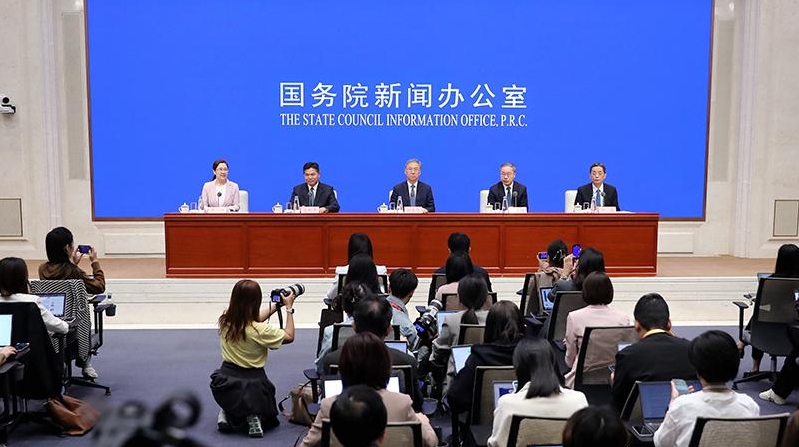China Daily:
China needs to import a large amount of grain, energy, and other bulk commodities every year. How much impact will the so-called "reciprocal tariffs" imposed by the United States on China have on China's grain and energy supply security? Thank you.
Zhao Chenxin:
Thanks for your question. I will answer it. You have raised a very important question. A few days ago, a friend asked me a question that was almost exactly the same. I take this opportunity to lay out some basic facts for everyone to further understand the situation and put their minds at ease.
Regarding grain. We have consistently followed national food security strategies, focusing on self-sufficiency through domestic grain production, ensuring stable production capacity, maintaining moderate food imports, and leveraging technological support. This is achieved under the strictest arable land protection system. We are committed to innovatively applying agricultural technologies to boost farmland productivity, steadily enhancing overall grain production capacity, improving the grain distribution system, strengthening government reserve management, and diversifying import sources. For the 21st consecutive year, we have achieved a bumper harvest. In 2024, grain production reached a record high of 700 million metric tons, with per capita grain availability at 500 kilograms, significantly exceeding the internationally recognized food security threshold of 400 kilograms. This ensures China's grain self-sufficiency and guarantees the absolute safety of staple food supplies. The Chinese people's food security remains firmly in their own hands.
In 2024, the proportion of grain imports from the United States, such as sorghum, corn, and soybeans, in China's domestic grain consumption is very low, and they are mostly feed grains. These varieties are highly substitutable, and the international market supply is sufficient; at the same time, domestic grain reserve resources are more than sufficient. Even without purchasing feed grains and oil seeds from the United States, it will not have any impact on China's grain supply.
Regarding energy. China follows the new energy security strategy of "four reforms and one cooperation," steadily enhancing the construction of its energy production, supply, storage, and marketing system. This approach enhances the flexibility and resilience of energy supply while continuously strengthening the country's capacity. China has basically formed an energy supply guarantee system driven by multiple sources, including coal, oil, gas, nuclear, and renewable energy, with an energy self-sufficiency rate maintained at over 80%. Annual crude oil production is stable at over 200 million tons, annual natural gas production has increased by more than 10 billion cubic meters for eight consecutive years, coal reserves and production capacity are abundant, renewable energy power generation capacity is close to 60% of the total installed capacity. The energy reserve system is becoming more complete and significantly stronger. Currently, domestic energy supply is sufficient, and market prices are generally stable.
The United States accounts for a low proportion of our energy imports. In 2024, the total amount of crude oil, natural gas, and coal imported from the U.S. is very small, accounting for a very low proportion of total energy consumption. China's energy imports come from diverse sources. Currently, the international energy market is well-supplied. The reduction or even cessation of energy imports from the U.S. has no impact on our domestic energy supply.
Next, we will work with relevant departments to continue to implement the national strategies for food security, practice the new energy security strategy with higher standards, pragmatically carry out international cooperation, and effectively ensure the stable supply of domestic food and energy with smooth operations in the market.
That's all I have to share. Thank you.
Shou Xiaoli:
Thank you to our speakers, and thank you to all the reporters for your participation. Today's briefing is hereby concluded. Goodbye, everyone.
Translated and edited by Liao Jiaxin, Chen Xinyan, Xu Kailin, Yan Xiaoqing, Xiang Bin, Li Congrong, Wang Mengru, Wang Qian, Zhang Rui, Zhang Junmian, Ma Yujia, Gong YIngchun, Yuan Fang, Huang Shan, Wang Yiming, Li Huiru, David Ball, Tudor Finneran, and Jay Birbeck. In case of any discrepancy between the English and Chinese texts, the Chinese version is deemed to prevail.


 Share:
Share: 




 京公网安备 11010802027341号
京公网安备 11010802027341号